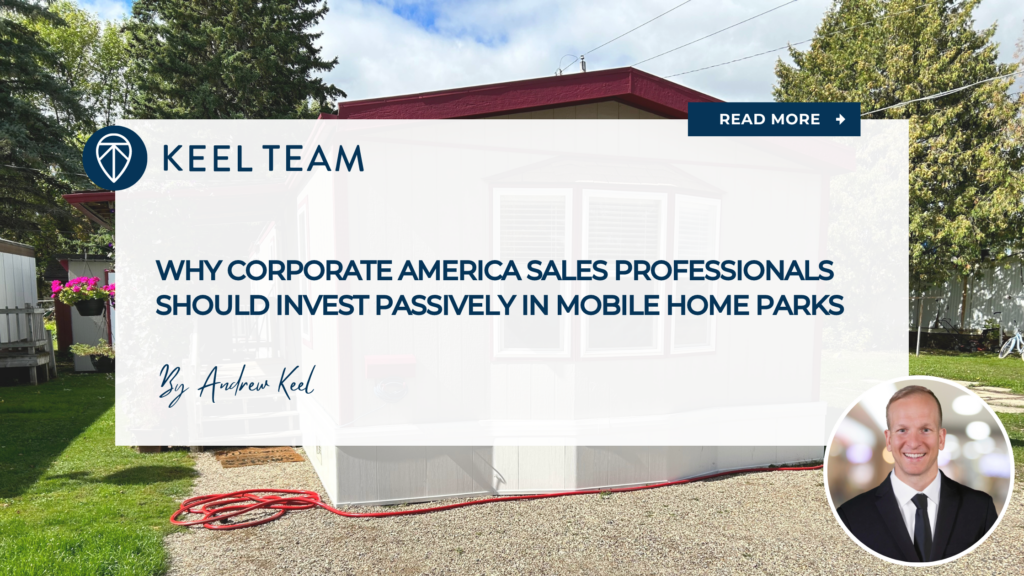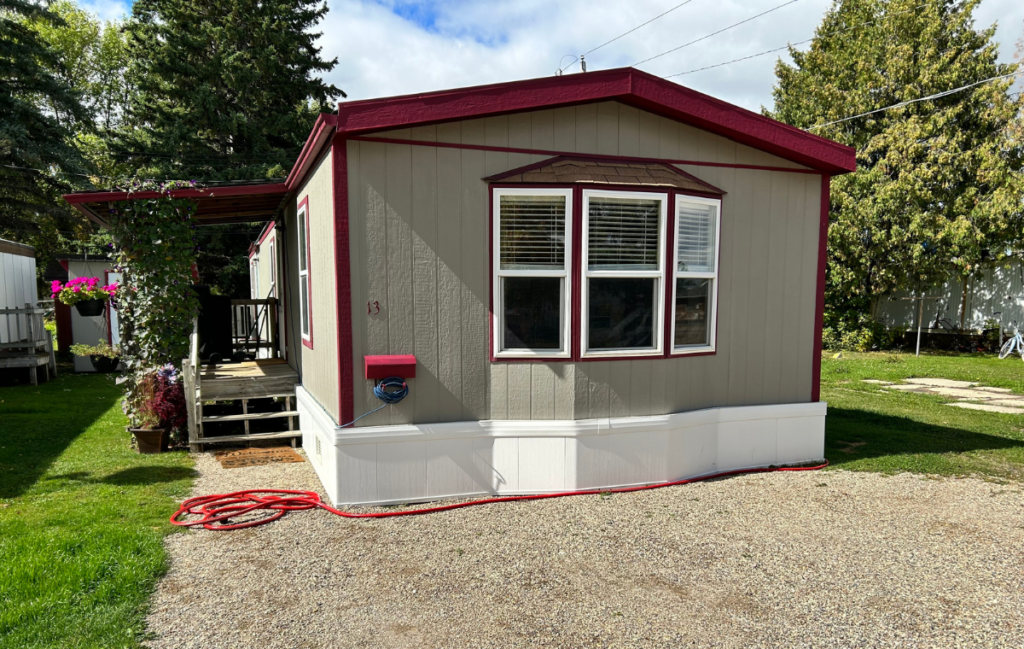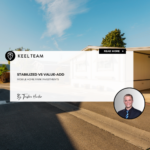Why Corporate America Sales Professionals Should Invest Passively in Mobile Home Parks
-
 Andrew Keel
Andrew Keel

Corporate America sales professionals are typically high achievers. Their roles require exceptional skill in communication, negotiation, and perseverance to hit sales quotas and achieve targets that lead to financial rewards. However, with the demanding nature of the profession and the uncertainty that surrounds the stock market, there is a growing desire among these sales professionals to diversify their income streams and build long-term wealth outside of traditional means. This is where investing passively in mobile home parks comes into play.
Mobile home parks AKA trailer parks or “manufactured housing communities”, are a powerful yet often overlooked investment option. Investing in mobile home parks as a passive income strategy has gained popularity among savvy investors, especially those in high-stress careers like sales. In this article, we will explore three compelling reasons why corporate America sales professionals should consider investing passively in mobile home parks: the ability to build non-correlated additional income streams, the tax benefits associated with this form of investment, and the positive societal impact of supporting affordable housing.
1. Build Non-Correlated Additional Income Streams
For corporate America sales professionals, much of their financial success is tied to the stock market, either through equity compensation, 401(k) accounts, or personal investments. While the stock market has historically provided solid long-term returns, it can also be volatile and unpredictable, especially in times of economic downturns. As many professionals learned in the 2008 financial crisis and the COVID-19 pandemic, relying too heavily on the stock market can expose them to significant financial risks. This is where mobile home park investments come in as a compelling alternative.
Mobile home park investments are a unique form of real estate investment that typically do not correlate with the broader stock market. Unlike traditional residential or commercial real estate, mobile home parks are considered a niche asset class. This niche nature creates a level of insulation from the fluctuations of the stock market.
Mobile home parks are often regarded as “recession-resistant” investments because they cater to the demand for affordable housing. In times of economic difficulty, the demand for affordable housing tends to increase, making mobile home parks an attractive option for those seeking low-cost living arrangements. This steady demand for affordable housing contributes to the consistent cash flow that mobile home park investments can provide, even during periods of stock market volatility.
Also in many mobile home park investments the tenants own their own mobile homes, providing a shared equity in the upkeep of the property and typically less repairs and maintenance expenses for the landlords.
For corporate sales professionals, this non-correlated income stream can serve as a financial cushion, helping to mitigate the impact of stock market downturns on their overall wealth. By adding mobile home parks to their investment portfolio, sales professionals can diversify their income streams and reduce their reliance on the stock market. This diversification strategy not only helps protect their wealth but also provides them with peace of mind knowing that they have a steady source of income that is less affected by external economic forces.
2. Tax Benefits of Investing Passively in Mobile Home Parks
In addition to providing a non-correlated income stream, investing in mobile home parks typically offers several tax benefits that can significantly reduce a sales professional’s tax burden. Understanding the tax advantages of mobile home park investments can help corporate professionals make more informed decisions and optimize their financial planning.
Depreciation
One of the most significant tax advantages of investing in mobile home parks is depreciation. Depreciation is a tax deduction that allows real estate investors to write off the cost of the property over its useful life, typically 27.5 years for residential real estate. However, mobile home parks have a unique advantage in this area. Unlike traditional real estate where the structure is the primary asset being depreciated, the land in mobile home parks is often improved with infrastructure such as roads, utilities, and landscaping. These improvements can be depreciated over a much shorter period, typically 15 years, allowing investors to take larger depreciation deductions earlier in the investment.
This accelerated depreciation can lead to significant tax savings for investors. For corporate America sales professionals in high-income tax brackets, these deductions can offset the income generated by the mobile home park, reducing their overall taxable income and lowering their tax liability.
Cost Segregation
Cost segregation is another tax strategy that can benefit mobile home park investors. This technique involves breaking down the components of a property into different asset classes, each with its own depreciation schedule. By segregating the costs of a mobile home park’s infrastructure, investors can accelerate depreciation even further. This can lead to substantial upfront tax deductions that can reduce the amount of taxable income in the early years of ownership.
For sales professionals who have a high taxable income, cost segregation can be an effective way to minimize their tax burden and increase their cash flow from the investment. By reducing their tax liability, they can keep more of their hard-earned money and reinvest it into other wealth-building opportunities.
1031 Exchange
The 1031 exchange is another powerful tax-saving tool available to mobile home park investors. Under Section 1031 of the Internal Revenue Code, investors can defer paying capital gains taxes when they sell one investment property and reinvest the proceeds into another “like-kind” property of equal or greater value. This allows investors to defer taxes on the sale of the property, enabling them to reinvest the entire amount of the proceeds into their next investment.
For corporate sales professionals who are looking to grow their wealth through real estate, the 1031 exchange can be a valuable strategy. By deferring capital gains taxes, they can compound their investments over time and continue to build their portfolio without being immediately hit with a large tax bill. This strategy allows them to defer taxes indefinitely, as long as they continue to reinvest in like-kind properties.
Are you looking for information on passive mobile home park investing? Download my FREE eBook and learn about the 10 things that I recommend you consider before investing in this exciting asset class!

3. Support and Preserve Affordable Housing
Investing in mobile home parks is not just a financially smart decision; it also serves a critical social need by supporting and preserving affordable housing. Affordable housing is a growing concern in the United States, where rising housing costs have left many families struggling to find safe and affordable places to live. Mobile home parks provide one of the most affordable housing options available, offering a critical safety net for millions of Americans.
For corporate America sales professionals, investing in mobile home parks can be an opportunity to make a positive impact on society while still achieving their financial goals. By investing in mobile home parks, they can help preserve and maintain affordable housing communities that are often at risk of being redeveloped into more expensive housing options. This not only helps to provide stable housing for low-income families but also prevents the displacement of vulnerable populations who may have limited housing options.
Mobile home parks are often stigmatized as undesirable or low-quality housing. However, many investors are working to change this perception by investing in parks that are well-maintained, safe, and vibrant communities. By investing in quality mobile home parks, corporate professionals can contribute to the revitalization of these communities and provide residents with a stable and affordable place to call home.
Moreover, investing in affordable housing aligns with the values of corporate social responsibility (CSR), which has become an important consideration for many companies and individuals alike. As sales professionals seek to align their financial goals with their social values, investing in mobile home parks offers a tangible way to contribute to the well-being of society while also generating a financial return.
Conclusion: Why Sales Professionals Should Consider Investing Passively in Mobile Home Parks
In conclusion, corporate America sales professionals have much to gain by investing passively in mobile home parks. These investments offer a unique opportunity to build non-correlated income streams, providing financial stability even during times of stock market volatility. The tax benefits, such as depreciation, cost segregation, and 1031 exchanges, can significantly reduce their tax burden and enhance their overall financial position. Additionally, investing passively in mobile home parks allows professionals to support and preserve affordable housing, making a positive social impact while achieving their financial goals.
For sales professionals seeking to diversify their income, reduce their tax liability, and make a meaningful difference in their communities, mobile home park investments represent a powerful opportunity to achieve financial independence and create lasting wealth.
Learn more about mobile home park investing.
Interested in learning more about mobile home park investing? Get in touch with us today to find out more.
Disclaimer:
The information provided is for informational purposes only and is not investment advice or a guarantee of any kind. We do not guarantee profitability. Make investment decisions based on your own research and consult registered financial and legal professionals. We are not registered financial or legal professionals and do not provide personalized investment recommendations.
Andrew Keel
View The Previous or Next Post
Subscribe Below 👇





